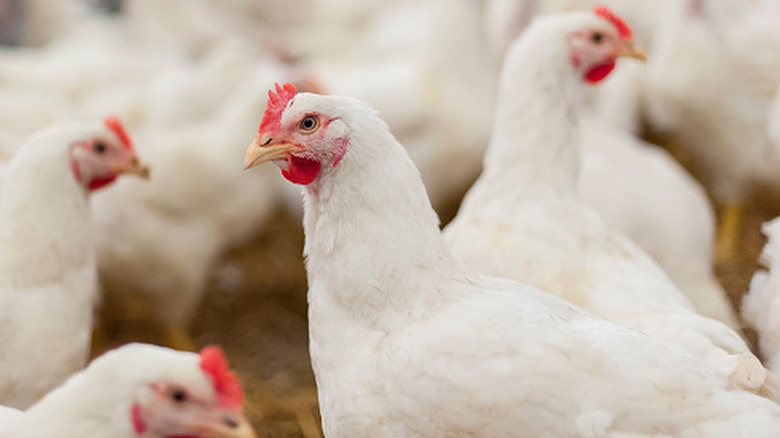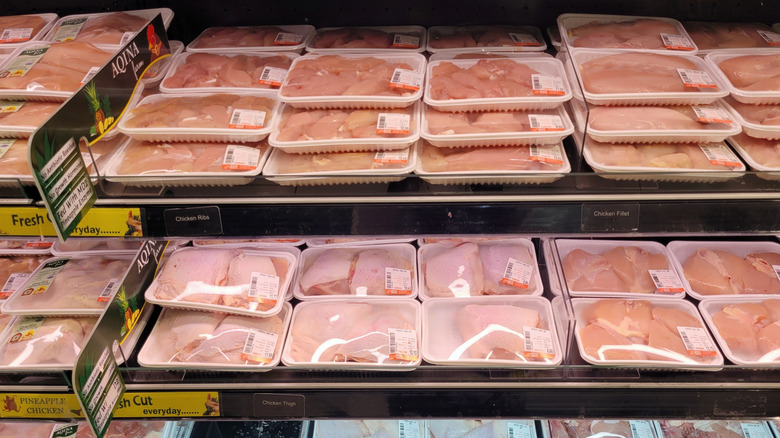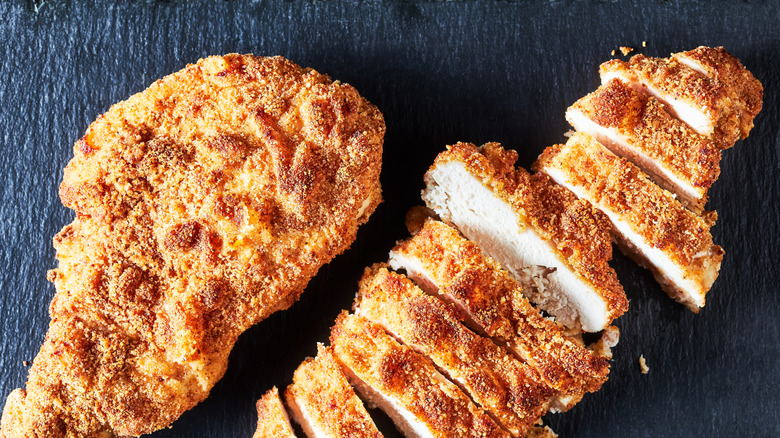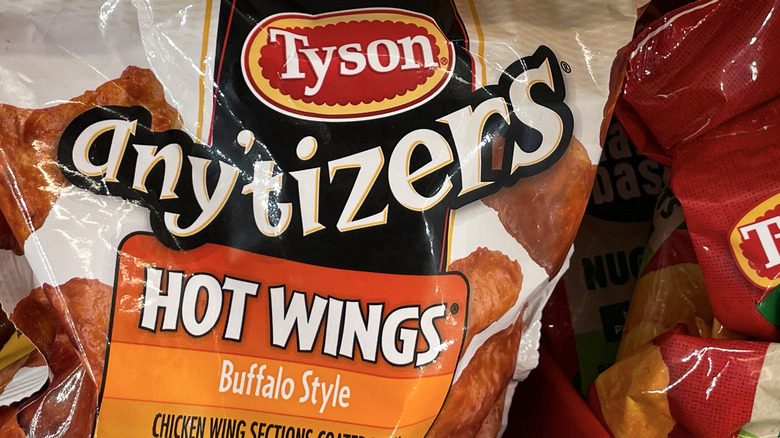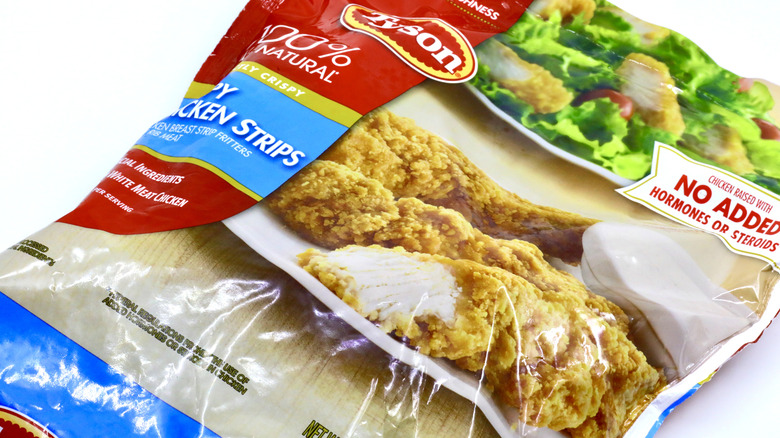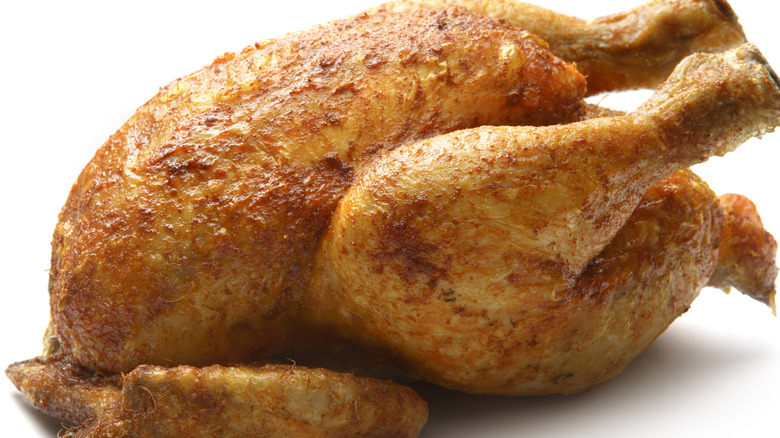The Biggest Chicken Recalls In US History
America is a nation of chicken lovers. People stock their fridges and freezers with everything from frozen tenders to whole birds and ready-to-eat breast meat. Unfortunately, that also means many households could be exposed to food-borne infections if this staple protein is tainted by harmful bacteria such as Salmonella, Listeria, and E. coli. The chicken might also be contaminated by foreign objects if some aspect of the production process goes awry. So it should come as no surprise that the popular bird has featured in some of the biggest meat recalls in U.S. history.
The magnitude of the incidents is staggering, involving millions of pounds of poultry. While many of the recalls did not result in reported illnesses, others had serious consequences for consumers. In addition to causing havoc for companies, such occurrences serve as reminders to always follow food safety guidelines, like keeping raw meat separate and cleaning surfaces exposed to raw meat.
2 million pounds of Simmons Prepared Foods chicken (2019)
In 2019, concerns over metal contamination spurred poultry product supplier Simmons Prepared Foods to recall over 2 million pounds of ready-to-cook items. The issue affected an array of products, including wings, tenderloins, and even whole birds that had been produced over a span of a few weeks in late October and early November. They were distributed to eight U.S. states, including Alabama, California, Georgia, and Oklahoma and were primarily shipped to various institutional locations.
The metal was discovered during routine processing by Simmons Prepared Foods. Foreign object contamination can occur at many points along production and could stem from suppliers, machinery in production plants, or problems that occurred during distribution. No injuries were publicly reported at the time of the recall, but the company was concerned that some of the compromised items remained in institutional freezers. So customers were urged to check for any products bearing the relevant establishment codes.
2.5 million pounds of Aspen Foods chicken (2015)
In 2015, Aspen Foods, a division of the Koch Poultry Company, pulled over 2.5 million pounds of frozen, raw, stuffed, and breaded chicken products that posed a risk of salmonella exposure. Announced in July of that year, the recall initially involved 1.9 million pounds of food. In October, however, further analysis uncovered that 561,000 pounds of additional products could also be contaminated with the same strain of bacteria. Thus the recall was expanded. These items were produced between April and September 2015 and distributed nationwide under various brands, including Sysco, Safeway Kitchens, and Kirkwood.
Leading up to the first recall in July, the Food Safety and Inspection Service (FSIS) was notified of a cluster of Salmonella-related illnesses and was able to trace them to Aspen Foods. In total, five people in Minnesota were infected, and two of them were hospitalized. No other illnesses were reported around the time of the second recall. In order to kill Salmonella, food must be cooked and reach an internal temperature of 165 degrees Fahrenheit.
8.9 million pounds of Tyson fully cooked frozen chicken (2019)
In July 2021, a listeria outbreak forced Tyson Foods to recall 9 million pounds of poultry products. Among them were chicken fajita strips, diced chicken breast, and even Little Ceasar's chicken wings. All were frozen and fully-cooked. This massive amount of chicken was produced between December 2020 and April 2021, and was distributed nationwide to both retailers and institutions like hospitals, restaurants, and schools.
The outbreak was linked to three confirmed listeriosis cases, including one death, that occurred between April and June 2021. The contaminated chicken samples collected by the FSIS were found to be genetically similar to the Listeria strains affecting the patients. Cases of listeriosis have historically involved meat, dairy products, and raw fruit and vegetables. You can kill the bacteria by cooking foods to steaming hot temperatures. Listeria will survive in the freezer but won't multiply quickly. Starting at temperatures of 24 degrees Fahrenheit, the bacteria will slowly grow.
11.8 million pounds of Tyson chicken strips (2019)
Tyson Foods has undergone many big recalls, plenty of which have to do with chicken. Its biggest one started in March, 2019, when approximately 69,000 pounds of ready-to-eat chicken strips were recalled in response to possible metal contamination. If that number seems too small, that's because it is. Roughly 11.8 million more pounds were recalled in May after the discovery of more extraneous material in chicken products. The company discovered the metal contamination after receiving a total of six customer complaints, three of whom reported oral injuries.
No flavor of chicken strip was spared, as the problem impacted BBQ, Buffalo, and crispy options in different sizes. The items were produced between October 2018 and March 2019 and had been distributed nationwide to retail, military, and institutional locations. The chicken traveled far and wide as well, reaching the U.S. Virgin Islands, Hong Kong, Bermuda, and St. Maarten.
Pilgrims's Pride Chicken and Turkey (2002)
The largest incident on this list by far happened all the way in October 2002. A deadly Listeria outbreak linked to the poultry producer Pilgrim's Pride resulted in a recall of 27 million pounds of food. At the time, it marked the biggest meat recall that the United States had ever seen. The outbreak primarily affected people in northeastern states and resulted in 46 confirmed cases of illness. Tragically, seven people died, making this one of the most deadly recalls in U.S. history.
The listeria contamination was traced back to Pilgrim's Pride's Franconia, Pennsylvania plant, where both food and environmental samples tested positive for the bacteria. Perhaps making matters worse, the tainted items didn't have to be cooked or even heated before consumption. They included a massive assortment of ready-to-eat offerings, including roasted turkey breast, chicken breast, and cooked deli-style chicken.
